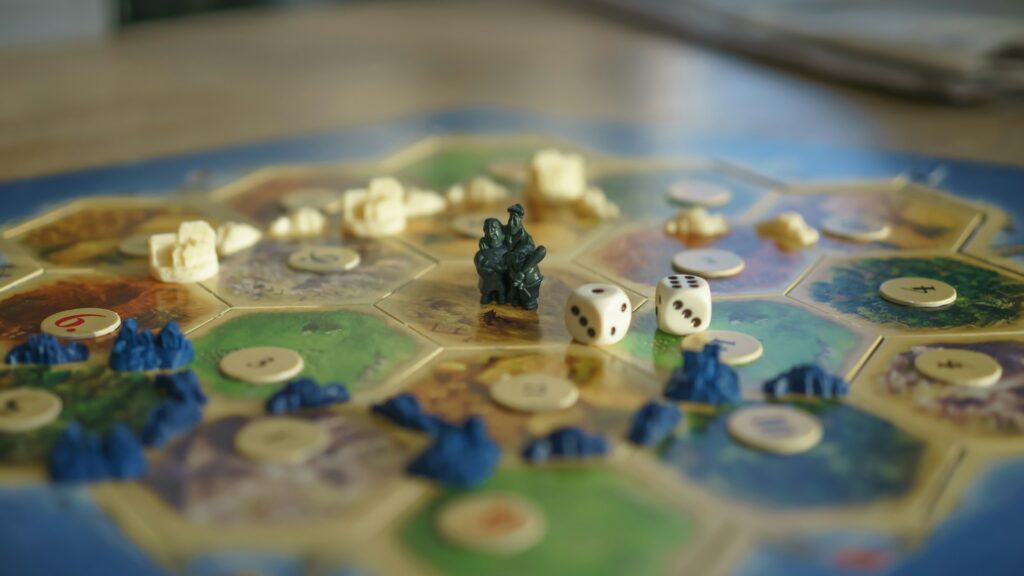As families congregate around tables, set aside their devices, and enjoy each other’s company, board games are seeing a rebirth in an era dominated by screens and digital distractions. A simple act, this kind of face-to-face interaction and social engagement is invaluable for families.
Playing board games as a family has a magical way of uniting loved ones and fostering enduring memories of competition and laughter. In a world dominated by screens, these timeless classics offer a welcome break, fostering quality family time.
Interactive Entertainment
In a world that can feel overpopulated with digital entertainment, board games offer a much-needed change of pace. They also provide a platform for family bonding that promotes communication, healthy competition, and the development of essential life skills.
The unique element that sets them apart from other forms of entertainment is their ability to cater to a wide range of ages and abilities. Whether through cooperative gameplay or titles that pair an older player with a younger one, they encourage everyone to participate and engage, fostering a sense of inclusivity and togetherness often lacking in today’s busy world.
During board game sessions, parents and children can enjoy each other’s company while building memories that will last a lifetime. The twists and turns in a game of Snakes & Ladders, the joy of a big win during a game of Carrom Board, or even the tears that sometimes come along with a heartbreaking loss can all become cherished family traditions and stories to be shared over and over again for generations to come.
Getting the entire family involved in fun family board games can be easy. For example, instead of just imposing a game on your kids, invite them to join in on the selection process by heading to your local gaming store or browsing online together. This way, they are more likely to be invested in their choice and will be excited to participate in your planned family game night.
Face-to-Face Interaction
Family members can connect in person when playing board games instead of watching TV or using a smartphone. This promotes communication and assists in tearing down barriers. This is especially helpful for families where siblings don’t always get along, as they are forced to interact in person to work together during the game.
In addition, many board games are designed for different ages, making them suitable for the entire family to play. This inclusivity allows siblings and parents to connect on a more personal level. Additionally, games can be a great way to practice empathy and good sportsmanship. For example, a child can learn to acknowledge their sister’s feelings when they lose and be gracious in victory.
While life can often feel like a routine of work, school, chores, and errands, adding a game night can help create a more balanced lifestyle. The laughter, friendly competition, and memories made during family game nights provide a lasting bond that can be cherished for years. So, turn off the TV and pull out a board game. You never know if it could be the start of a new family tradition!
Healthier Competition
Board games require players to interact with each other, think strategically, and communicate effectively. This social interaction helps families learn to listen and respect one another’s perspectives while promoting healthy competition, critical thinking, and problem-solving skills. It also encourages family members to support one another’s successes, even in defeat. This, in turn, fosters trust and builds character.
So, shut off the WiFi connections, put away the tablets and phones, and get your family together for a game night! The fun will be infectious if you’re playing a classic like Monopoly or a newer version of Clue. Plus, you’ll reap all the mental health benefits of unplugging and focusing on your loved ones!
Life Skills
Board games help to improve communication skills for both children and adults. Players learn to effectively convey their ideas, listen attentively, and collaborate in a supportive environment. Communication is further enhanced by the rules of the game, which encourage players to follow instructions and take turns. These skills can be applied through family conversations, problem-solving strategies, and school work.
Moreover, playing board games helps to cultivate an understanding of healthy competition. In the game, children can learn to accept defeat and celebrate the victories of others, which can be transferred to real-world situations that require resilience, sportsmanship, and positive social behaviors. Furthermore, parents play a critical role in supporting their children during play and providing examples of prosocial behaviors such as waiting one’s turn, helping others, and expressing gratitude to those who help.
With so many benefits, it’s essential to incorporate board games into your family’s regular activities. Try limiting screen time and replacing it with a night of family gaming. Not only will it make the experience more enjoyable, but it will also have a positive impact on your family’s emotional connection and overall well-being. So, what are you waiting for? Start your unplugged and connected family bonding with a classic board game.







